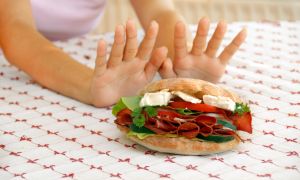A good mind-set for approaching calorie control is to think of the calories you consume and the calories you burn as your calorie budget. How do you want to "spend" those calories?
- To lose weight: Consume fewer calories than you burn each day. Either cut back on the calories you consume, exercise more or do both.
- To gain weight: Tip the balance the other way. Take in more calories than your body uses. However, your body still needs physical activity to remain healthy, so keep moving.
Simply stated, if you take in more calories than you need on a daily basis, the excess calories turn into extra weight. Think of food as fuel and your body as a car. Food is the energy your body "runs" on. Overeating is like over-fueling; any excess fuel you don't "run on" turns into fat. This is how weight gain occurs. Because of this basic principle (calories consumed versus calories spent), the cause of weight loss is just as straightforward as the explanation of weight gain. If you consume fewer calories than you burn, you will lose weight. The basis of every weight loss diet is based on this. Whether you follow a low-fat or low-carbohydrate/high protein diet or you reduce portion sizes, all varied means to the same end: fewer calories consumed.
Calories do count; however, you need to count every single one. It's a balance over time of calories eaten vs. energy used. Want to simplify without the calculator? If you eat more one day, eat less the next. Yes, that's easier said than done, I do know. In addition to reducing calories (100 per day is all you need to do) increase your physical activity. Park at the back of the grocery store lot instead of circling until you get a prime parking spot. Take a 10 minute walk twice a day to start. In no time, you'll feel better and will want to increase to 20 minutes per day. Another strategy for balancing calories is to eat 2/3 of what you currently eat. Just put the fork down. Don't deprive yourself if you crave a sweet treat. Eat two bites slowly and chew thoroughly. You may find that's enough to satisfy the craving instead of wolfing down the whole sweet treat. The bonus is that you'll feel better and have more energy.
There is a direct relationship between the weight we lose and calories. The calorie is the unit we use to measure how much energy is in food (in the form of carb, protein, fat, alcohol) and how much energy we store or use (body fat and body sugar stores).
So the direct relationship looks like this: one pound of fat on our bodies is equal to 3500 calories. We need to burn more calories than we eat to give our bodies a reason to use stored energy, which is exactly what body fat is: stored energy. So for every 3500 calories we burn above what we eat, we use 3500 stored calories. Keep in mind this doesn’t’ mean that we can try to create this gap within a single day. This would be unhealthy and have other negative effects on our health and energy levels.
For example to lose one pound per week, we would need to burn 3500 calories more than we ate over the course of that week. Another way to think of that is we would need to burn 500 more calories per day than we consume. We can accomplish this by incorporating a sensible reduced calorie diet and increased physical activity.
The calorie equation is still considered the standard in weight management. The calorie equation states that calories in must equal calories out to maintain your weight. It holds that if you eat fewer calories than you burn (with daily activities, exercise, etc.) you will lose weight. Unfortunately the opposite is also true that if you eat more calories than you burn you will gain weight.
To lose a pound a week, you must burn (or cut back on) about 3,500 calories over the course of the week. This equals about 500 calories a day. So that it's easier to manage, consider eating 250 calories fewer and burning an extra 250 calories per day in physical activity.Calories are everything when it comes to how much weight you lose. Losing weight is a simple math problem, and calories are the units we use to solve it. Calories are a way for us to measure energy. With that said anything that we do – from the normal physiological processes that keep us alive, to physical activity – requires energy and thus, calories to do it. Foods also have a caloric value to them that’s based on the amount of energy-yielding nutrients (proteins, carbohydrates, fats, and fiber) that they contain.
To maintain your weight, the amount of calories you consume from food would have to equal the amount of calories your body burns on a daily basis – essentially canceling each other out. In order to lose weight you must consume less calories from food than the amount of calories you burn though activity and your body’s metabolism. When you create a deficit between how many calories you consume and how many calories you burn it requires your body to use stored fat for energy. We know that 1 pound of fat equals 3500 calories, so in order to reduce your weight by 1 pound a week, that would require you to create a deficit of 3500 calories (500 calorie daily deficit x 7 days); to lose more weight, simply create a bigger deficit. For example, reducing your food intake by 500 calories a day and increasing your physical activity to burn an extra 500 calories a day will create a 1000 calorie daily deficit, which will lead to 2 pounds of weight loss a week.
Continue Learning about Calorie Restriction and Weight Loss
Important: This content reflects information from various individuals and organizations and may offer alternative or opposing points of view. It should not be used for medical advice, diagnosis or treatment. As always, you should consult with your healthcare provider about your specific health needs.











